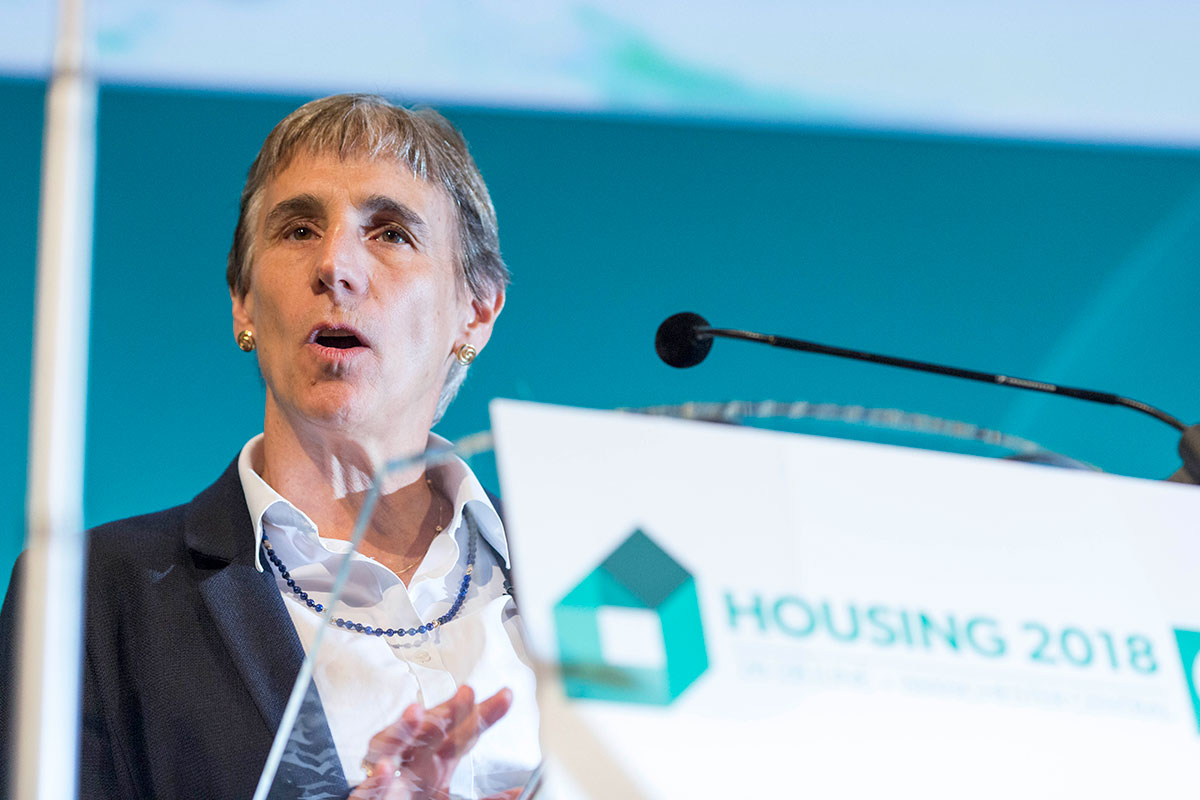You are viewing 1 of your 1 free articles
In full: James Brokenshire’s speech to Policy Exchange
The housing secretary gave a speech to the Policy Exchange thinktank this morning, in which he set out proposals for minimum three-year tenancies. Read the speech in full below
Below is the text of the speech given by housing secretary James Brokenshire on 2 July. We have retained the headings in bold including in the copy of the speech circulated by the Ministry of Housing, Communities and Local Government.
“It’s great to be back at Policy Exchange – my first time as housing secretary.
I welcome this first opportunity to provide a sense of some of my priorities and the agenda before me in my new role.
Having previously covered the immigration and Northern Ireland briefs, I have always relished a challenge.
And housing is, I believe, the defining challenge of the moment.
Last weekend, Sir Oliver Letwin likened this need to collaborate on housing to the wartime effort to build Spitfires.
I agree that we need to see more of this can-do spirit.
I’m also reminded of Britain’s post-War push on housing. The 1951 Conservative manifesto described housing as “the first social service”.
I agree.
It was that understanding – that housing is the key to better life – that underpinned Harold Macmillan’s drive to meet his ambitious target of building 300,000 homes a year.
We need to do the same and get everyone on board to build at scale and pace.
But I’m mindful – this isn’t just about getting the numbers up. We don’t have to make a false choice between quality and quantity.
It’s also about building places that people are happy to call home. Places where they can come together in strong, thriving communities for generations to come.
The challenge
Everyone deserves a decent, affordable and secure place to call home. It’s the most fundamental of human needs.
But for too many people, that need has become an increasing struggle – as house prices and rents go through the roof.
The figures speak for themselves.
The average house price is eight times average income.
It’s no surprise today’s generation is half as likely as their parents to own their own home.
And private rents no longer track people’s earnings. In some parts of the country you can expect to spend more than half of your salary on rent.
“The security and opportunities that previous generations have enjoyed is passing them by.”
We should never forget the people behind these numbers. People who just want a fair chance.
The family who can’t afford a bigger place for their children to grow up.
The young professional who can’t take a job in a new city due to sky-high rents.
The older couple who want to downsize, but can’t find a suitable home.
These are people who have worked hard and made sacrifices.
Yet the security and opportunities that previous generations have enjoyed is passing them by.
This doesn’t just hurt them.
When a generation is locked out of the housing market like this, it hurts us as a country.
Which is why, today, there is no mission more urgent than fixing our broken housing market.
It’s not just an economic mission – it is a moral mission.
It’s about social justice and building a fairer, stronger Britain that’s truly fit for the future.
It’s why confronting rough sleeping and some of the broader challenges of homelessness is an important priority for me.
And why I will shortly be publishing a Social Housing Green Paper to respond to the concerns of tenants, underlined in the wake of the Grenfell Tower disaster.
Leaseholds
That fairness has to underpin all parts of our market.
The leasehold market has been a particular concern to me.
Buying a home is the biggest financial investment any of us will be lucky enough to make.
Getting the keys to your home is a real moment of pride.
But abusive practices in the leasehold market – unexpected costs that rise every year and bear no relation to services – can turn a homeowner’s dream into a nightmare.
Unjust and unfair leasehold terms also risk making relatively new houses unattractive to buyers.
Enough is enough. We’ve already said we’re banning the unjustified use of leaseholds on new homes and we will bring forward legislation at the earliest opportunity.
And for flats, in future, ground rents for long leases will be limited to a peppercorn.
But today I can confirm we will go a step further.
“We want to build more homes, yes, but not at any cost.”
Any new government funding scheme will contain the condition that the money cannot support the unjustified use of leasehold for new houses.
We want to build more homes, yes, but not at any cost.
This will bring real change – an essential step to restore pride and dignity to homeowners everywhere.
Renting
We are also bringing real change to make renting more secure.
I know this is particularly important for the growing number of families, vulnerable tenants and older people who rent and live with the uncertainty of suddenly being forced to move or fear eviction if they complain about problems with their home.
Which is why I’m announcing the launch of a consultation today on overcoming the barriers to longer tenancies in the private rented sector.
We’re proposing a new longer tenancy model, of a minimum of three years, with a six-month break clause to allow tenants and landlords to exit the agreement early if needed.
I will also be launching a call for evidence in the autumn to better understand and improve the experience of people using courts and tribunal services in property cases, including considering the case for a specialist Housing Court.
Ownership
And we are helping those tenants who aspire to own their own home. Because homeownership is something we should be aspiring to.
When I speak to people in my constituency – and across the country – I hear it time and time again: “We just want that chance.”
And rightly so.
This government is committed to helping people achieve this aspiration.
Since 2010, government-backed schemes have helped over 468,000 households buy a home.
“Owning your own home is, I believe, the cornerstone of our communities.”
The number of UK first-time buyers is at an 11-year annual high.
But this ambition still remains out of reach for many.
That’s why I will be considering further steps in the time ahead on turning the vision of homeownership into a reality.
Owning your own home is, I believe, the cornerstone of our communities.
And, as laid out in our Housing White Paper, it’s a mission that requires everyone who has a stake – government, local authorities, the private sector and communities – to play their part.
Government action
And since 2010, we have worked tirelessly to play ours.
We have delivered over a million new homes.
And in the last year, we saw over 217,000 new homes delivered – the highest number in all but one of the past 30 years.
We’ve also helped hundreds of thousands of people onto the housing ladder and are putting billions into affordable housing and infrastructure.
And, following last week’s announcement on raising the Housing Revenue Account cap by £1bn and investing £1.67bn in social housing, we’re paving the way for a new generation of council housing.
In total – with the £15bn of new financial support announced at Autumn Budget – we’re investing £44bn in housing over the next five years.
But we’re also building the environment for housebuilding to flourish.
Our new National Planning Policy Framework – coming into force shortly – will transform planning.
And our new national housing agency, Homes England, is taking a more strategic – and assertive – approach to getting homes built.
This will have real impact.
You can already see it in places like Burgess Hill – a site that is desperately needed for affordable housing but which sat undeveloped.
To unlock this site Homes England stepped in, bought the land and is delivering the infrastructure. And as a result, today I am pleased to announce that over 3,000 new homes will now be built there.
We are making every effort, from every angle, to get Britain building.
Transparency
But there is clearly much more to do – not least on turning planning permissions into homes.
Since 2013, build-out – in other words, the time between planning permission and completion – has gone from 1.7 years to four years.
Sir Oliver Letwin is leading an independent review of build-out.
In his interim report, Sir Oliver found it takes over 15 years to complete homebuilding on some of the country’s biggest sites. The larger the site, the smaller the percentage of development is built each year.
Moreover, we’ve seen a 40% lapse in planning permissions.
Here in London, 270,000 residential planning permissions remain unbuilt.
This is, frankly, not good enough.
Planning permissions that don’t become homes mean:
- a teacher can’t afford to live in the community she works in,
- a couple putting in extra shifts to save for a deposit now have to wait longer, and
- a growing young family can’t move forward with their lives
I want developers to work with us as partners to help build the homes we need.
In doing so they must deliver on their commitments to communities.
At the moment, there are too many instances of developers wriggling out of these commitments – particularly on providing affordable housing and essential infrastructure.
So it’s no wonder, then, that communities feel let down.
And when they feel like the system is stacked against them, they are less likely to welcome new development.
We’re addressing these issues head-on through our consultation into reforming developer contributions.
These will ensure that developers are left in no doubt about what’s expected of them. Local authorities will hold them to account.
This new approach also calls for much greater transparency.
It’s something we sought as part of the voluntary deal with the Home Builders Federation and expanded on in our Housing White Paper.
In future we will require more information from developers on the timing and pace of delivery of new housing – and we’re currently looking at measures that will make this reporting a compulsory requirement.
Innovation and competition
As well as this injection of transparency, we also need more innovation and competition into the market – a market that has become far too reliant on a small group of large developers.
That means embracing so-called modern methods of construction and innovation that will allow us to build faster and drive up choice and quality for consumers.
The future is high-quality, energy-efficient, manufacturing-led houses – all built with Britain’s world-class technology.
And while lack of access to labour has all too often been a brake on production, new methods of construction offer a chance to build at pace with a leaner and high-skilled workforce.
And I want to see the whole sector, public and private, getting behind the latest innovations in development and building.
We’re supporting builders to do this through initiatives such as the £3bn Home Building Fund.
In doing so, we’re also backing the small and medium-sized builders who were all but wiped out in the financial crash. We want them to grow and deliver once again.
Our Accelerated Construction Programme is an example of this, our vision in action.
We’re working with local authorities to identify suitable surplus public sector land.
And today we’re releasing £450m to speed up delivery on these sites, by encouraging the use of modern methods of construction and SME [small and medium-sized enterprise] builders as a part of this process.
The prize in our sights is a much more diverse market where modern methods of construction are in the mainstream – and Britain is a leader in the field.
Skills
Looking to the long term – as Sir Oliver has so rightly highlighted – it’s vital that we build our skills base.
We’re doing this through the education system, with the most significant reform to advanced technical education in 70 years: the T-level.
From 2020, T-levels will be a high-quality technical alternative to A-levels, rivalling some of the world’s best-performing systems.
Apprenticeships are also a powerful tool to ensure our next generation is ready to take on the high-skilled, high-wage jobs of the future and deliver the homes we need.
Design and settlements/communities
But, as I said at the start, in getting Britain building, this isn’t about meeting abstract targets for the sake of it.
Our guiding light in everything we do must be people – whether they are renting or buying, we must give them the security and dignity they need to build a better life.
And places that feel like home.
But sadly, when it comes to delivering homes, these things are often the last consideration – when they should be the first.
We need to change this – and remind people that when they’re building homes, they’re also building communities.
Think about it: when you build a housing development of 500 homes, that’s bigger than most villages.
So it’s vital that these homes and places lift our spirits when we live in them and when we pass through them.
And that, in years to come, become strong and well-loved communities that can truly thrive.
The philosopher Sir Roger Scruton, who I’m pleased is in the audience this morning, once remarked: “Architecture is a public art: whether we like it or not, we are forced to witness it.”
Design and style matter, and while we in government certainly won’t be dictating to local areas what good design looks like, it needs to create a strong sense of belonging.
A sense of identity.
A sense of home and comfort.
Somewhere people can identify as their place.
Community-led housing – in all its forms – is an important part of this.
And today I can announce that a new Homes England programme to deliver the Community Housing Fund is being launched today.
This new programme puts communities in the driving seat to deliver housing the mainstream market can’t.
Over £100m is available within the fund this year and sufficient funds will be made available to Homes England to meet demand and deliver value for money.
This long-awaited measure has the potential to unlock 2,000 new homes that are genuinely tailored to local needs – and affordable in perpetuity.
Conclusion
Because public demand for more homes is growing – and public patience for unnecessary delays has run out.
And because people in this country still buy into that fundamental idea, that if you work hard you will be rewarded.
So do I. And so does the prime minister.
The public demands nothing less. They deserve nothing less.
They will not be forgiving if we put politics – and profits – before people.
Housing is one of the great social justice issues of our time. An issue that challenges us to think about who we are as a country.
Because a home is so much more than a roof over your head.
It’s your castle and your safety net. Your sanctuary and springboard to a better life.
Homes are the backdrop to our lives and the basis of strong and confident communities.
The basis of personal security and stability.
Which rightly makes it this government’s domestic priority. And why it is a privilege to lead on this work.”
James Brokenshire, housing secretary, speaking to thinktank Policy Exchange on 2 July 2018



